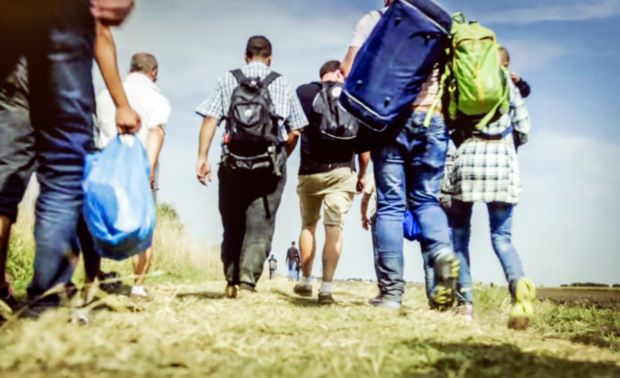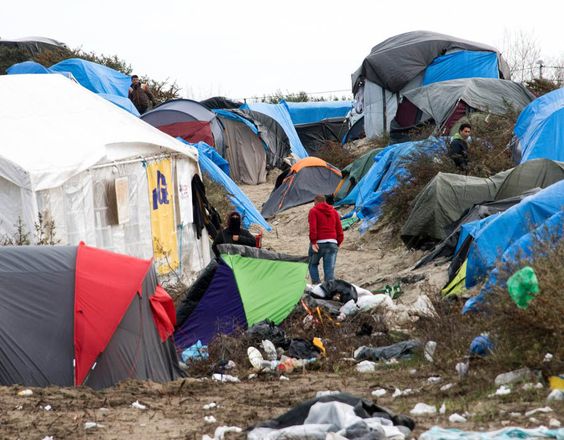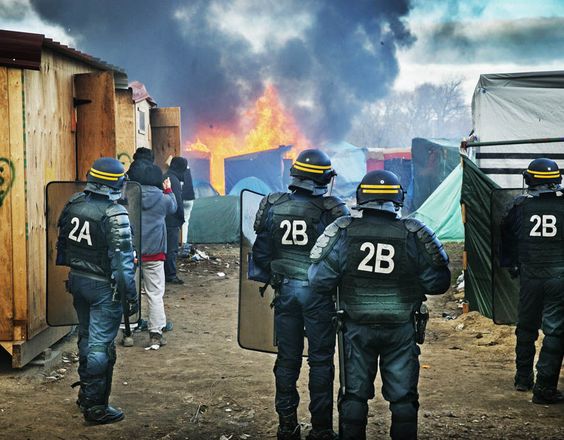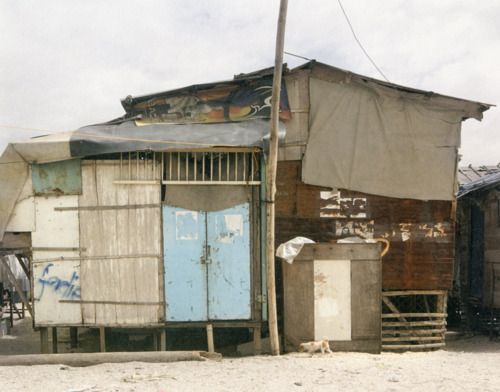With the intensity of natural disasters growing year by year and seeing that such disasters can relocate a large number of people, we can’t help but wonder where all these will people end up.
In the last decade or so, we’ve all witnessed a large number of refugees fleeing a country ravaged by war or brought to its knees by the economic meltdown. Some of them managed to integrate rather peacefully in their new environment while others have become a problem for the countries that made all the efforts to resettle them.
I can understand the concern of some people having to deal with external refugees, but what concerns me the most is that nobody is talking about the domestic ones. The people that have the same rights as you and me, the ones being forced to relocate due to reasons or events that were out of their control.
If a major disaster occurs in the United States or some apocalyptic event if you will, we will have to deal with a human exodus right here and now and we have no clue to what this may lead to.
What are domestic refugees?
Currently, the people you work with, the people you know on a personal level and distant relatives you visit once a year, can all become domestic refugees at some point.
The people that are forced to migrate inside their own country is what we call domestic refugees. The ones that are forced to move from one place to another in search of a safer living area where they can regrow their roots.
I’ve often heard preppers call these people “the unprepared,” but that’s not how this really works. No matter how well-prepared you are, an event that will force you to relocate can happen to anyone. It may be right that if you are a prepper or a homesteader living off the grid, your chances of surviving a SHTF event are higher, but sooner or later, you will have to interact with these refugees.
Should we be concerned about them?
We live in a great country with infinite development potential for everyone, but that doesn’t mean we can’t have our own refugees. I honestly believe that this is something that needs to be addressed, and people seem to forget that there are certain events that can cause a great human migration within our borders.
You’re probably aware of the warnings NASA has been issuing for the past 15 years regarding the solar activity and how it can affect our way of life and send us back to the dark ages. While the government is preparing for such a scenario for a few years now, the general public will have to deal with the outcome of such an event on their own.
Imagine a large city hit by an EMP. That area will not be able to sustain life once the resources are cannibalized. People will have to move in order to survive.
How will domestic refugees behave when SHTF?
As history showed us, people act differently when resources are scarce, and their survival is at stake. They will either migrate to a friendlier environment, or they risk it all and try to make it work with what their current environment has to offer, often competing with others over what is left. While this might have worked in the past, in our modern world, where we are chained by technology, the survival spirit of humans is bearly alive.
Modern humans will act like locusts, and once they cannibalize the resources from an area, they will move to the next one. They will continue to do so until they find a place that could accommodate most of them.
Unfortunately, very few have the knowledge to survive and start over with what they can find in a particular environment. Even if there are some who manage to start over, things will not go smoothly because they will eventually have to fend off wave after wave of domestic refugees. Not to mention that the locals will not welcome everyone with open arms since there are unknown factors that can put all of them in danger.
The longer people will struggle to survive, the more desperate they will become. And once desperation settles in, they will do whatever they can to survive another day. The worst part is that some of them already have the means and knowledge to fight for what they believe is the right thing.
As preppers and law-abiding citizens, we have to understand that not only external refugees can become a problem when SHTF. Land and resources have always been the reasons for starting a conflict and building kingdoms. I believe that before we prepare for external threats, we should at least acknowledge that someday we may have to handle and deal with the local refugees.
How to deal with local refugees?
Now, this is the million-dollar question, and it’s quite hard to provide a proper answer. However, there are many factors that can influence the outcome of such a scenario. One thing I can tell you for sure is that you are the lone wolf type, you won’t be able to survive for long. In this case there is safety in numbers, and you should have your own survival group.
A post-collapse community is a must, and it should cover all aspects of organization and leadership. If you are part of such a community, you have better chances of surviving than staying hidden all the time and ahead of the “heard.”
Even with a community, there will be people coming and requesting access. The leader and main pillars of the community will have to consider the implications of allowing more people in. Every decision they make will eventually affect the entire community.
Besides having one more mouth that needs to be fed, they also have to put in balance the benefits outsiders may bring to the community.
There are some general guidelines that can be followed as a survival group when taking new people in.
- Access can and should be granted if the person is known in the community or owns property within its boundaries. Access should be granted only if the person can prove ownership of said property. This can be done by showing some form of identification or by other residents vouching for them.
- Access can and should be granted if the person is a family member of current residents. However, this will often be done only if the residents acknowledge responsibility for them. If the community can no longer accommodate new people, a voting process will be required to make sure everyone is on board with the decision (whatever it may lead to).
- Access can be granted if the newcomer proves that he or she owns specific skills that are needed the needs of the community or improve its development. Every survival group has its own strength and weaknesses and new people should be accepted only if they can increase the strength of the survival group. This also requires a vetting process and residents within the community that have similar skills should be involved.
Unfortunately and although it may seem inhumane to do so if the refugees have no propriety or familial connection within the community or the ability to offer necessary skills and experience, they should be sent on their way.
Click here to get your Green Beret’s Guide to combat shooting mastery & active shooter defense!
In most cases, refugees will request food and water if they are not granted access. However, chances are there won’t be any room for charity. Depending on the nature of the event and the size of your community, there might not be enough supplies to have the luxury to give some away. The needs of the community will always come first.
Such situation may lead to unpleasant situations where you might have to remove the strangers from the perimeter of the community.
You have two options to do so:
- Deny access at gunpoint. It may well come to that if people are desperate.
- Escort them along a specific route through town, to the other side.
You should never detain them, and you should explain the reasons why they need to move along.
Regardless the option you will face, there are some pros and cons, that the leaders need to take into account.
If you deny them access and ask them to leave, there is the danger of them attempting to enter the community through an unobservable point. Even if the area is patrolled, you won’t be able to keep it under 24/7 surveillance. The good part about this approach is that if it works, the outsiders won’t see what’s inside at all. They will not be able to spread the word about what you have and mark your community as a target.
If you decide to escort them through the community, you have the guarantee that they’ve moved on and you are able to keep an eye on them until they do so. The bad part is that you will basically give them a guided tour of the community, and this puts you in a vulnerable position. They may use the knowledge against you, or they can trade the information to someone else down the line.
Whatever the leaders decide to do, it’s important that everyone involved in the decision-making process is aware of the rules and they have the strength to enforce equality to the letter.
The guards of the community, the first to get in contact with the refugees should be instructed on how to act under various conditions. Even more, they should have a selection measure well established for letting someone in. It may sound amusing, but they shouldn’t let someone advance or enter the community just because they are an attractive person.
If some of the refugee approaching the community has the skills desired by the community should be detained in a location near the gate until questioned further. As I’ve said before, the needs of the communities will vary based on the number of members, location, and available resources.
In any survival group/community, the most desirable skills are:
- Medical – including alternative medicine
- Dental
- Security
- Gunsmithing
- Veterinary
- Food preservation
- Blacksmithing
- Woodworking
All potential new members need to be quarantined for a couple of days before being granted full access inside the community. They need to be examined by medical personnel to make sure they are not carrying any disease. The quarantine should be located near the outskirts of the community to prevent the spread of the disease the refugees may be carrying.
Another thing mandatory is to question every potential new member, and it’s best to do so during the quarantine period. They should be asked about the world outside the community since they are the ones who can provide an exact picture of what is happening outside. What they saw, what they heard are details that can become crucial to the survival of the community.
Every new member needs to be supervised and educated, so he or she may properly be integrated into the community. This will help them understand the rules that can often time may greatly vary from what is considered common sense and it will help them to stay out of trouble.
Concluding
When it comes to a major scale disaster, we must acknowledge that the event will create what is known as domestic refugees. Survival is possible only within a properly structured community, and you can’t make it without one, no matter how much you struggle.
A community will help you deal with those surviving the disaster and handle the human factor carefully. The human factor is the most unpredictable of all the things following a disaster, and it becomes difficult to prepare for when everyone has the same rights, the same knowledge of the land and the same will to survive.


























































































good to know and think about
I see dental skills listed among the desirable skills in the refugee population.. While a dentist has a better understanding of human anatomy and disease than the average guy on the street, I am wondering just how much good a dentist can do without any of the tools and supplies of modern dentistry, or even medicine. Is his contribution going to be more related to medicine?
In the 1800s, dentists were, for the most part, practitioners who pulled teeth. Without electric drills and modern compounds for fillings and such, exactly what will the dentist contribute?
Even if the refugee dentist does not have their own tools, it seems to me to be a given that the group certainly would. Just like medical, and almost all other skillset tools, even if no member possesses the actual skill. I know I have many of them on my own, and each of the groups of which I am associated has various types. We can accommodate dozens of different skills if acceptable people show up with a needed skill.
Just my opinion.
Just gotta say this idea turns my stomach.
Basically what you saying is ignore your nieghbour
Leave them to starvation ,predation or sickness at the point of a gun .
Surely you can not treat your fellow countryman this way ?
No “one” house can provide for a whole nation but that nation is a collection of houses working together for the good of all.
Training,trading,supporting each other?
Jeez'( I almost sound like a damn liberal !!)
(Hold on while I throw up…….)
So if Mom and two little girls say ” were hungry and scared ” .
Would you really cock your gun ?
What if they face you down ?
Would you shoot an unarmed mother a children?
A wheelchair user ?
Could you shoot a hundred, a thousand?
Can your community provide all it’s own Labour, all it’s own guards.
All it’s own grave diggers ?
Even against a hundred or a thousand ?
Ever heard the one about “give a man a fish etc?”
Could it be possible to assist the refugee to survive outside your crucial perimeter?
That way your manpower reserve(allies) increases and potential enemies decrease .
There is no easy solution to any disaster small, large, short term or everlasting but is it not possible that uniting maybe a better option than separatism .
If a refugee constitutes a threat then…..
(ah now I’m no liberal !!)
Ive Just realised the duality of local and international refugee !!
No matter.
Come in, join my house.
Enjoy it’s shelter and warmth.
But if you threaten it’s foundation? You will be my enemy and no quarter given .
Comments welcome……(before I run for office or my life )
How did a woman with two little girls make it that far? Or any distance at all?
Please watch the series “Jericho”.
We are in the situation now because of this type of thinking. You will not know the betrayal until it’s too late. And what if your retreat is not the best for them? What if your community is almost out of food, rationing what is left, and the community over in the next county is better equipped. Do you want them to starve with you?
I would quarantine for infections and infestations, not just diseases.
Can you imagine an individual ingested with lice?
My guess is most people in situations like these will have lice.
You are being too simple. Your group cannot sustain a grou twice its size or larger. I think we should plan for these refugees. I have some dog food that I am p[utting away for them. If we do have a community like the writer describes with guards I would supply the fuards with some of this dog food. I would train them to hand sopme out to thge refugees and tell them it’s what we are living on. The refugees will see your place as a port in a storm but they will find better ports where they aren’t expected to eat dog food.
Just a thought: maybe have pamphlets printed ahead of time for COMMON edible and usable “weeds” (with pictures and basic instructions) for those being sent on without other assistance. When SHTF there will be no more social safety net and all resources have an end. The phrase is “Root, hog, or starve.” Knowledge is one of few things that can be shared without running out. A hand UP is one thing, a hand OUT is vastly other, and there is all the difference in the world between “can’t” and “can’t be bothered.” The first is voluntary, the second is immoral.
Amazing article! Horrible to think about, but hey, fans tend to spread the muck faster than it can be cleaned. Yep, it’s not kindly to think you’ll probably have to cast out people.
Please continue posting! I learn more every day.
The central issue that NoOne has addressed – just how easy (or possible) is it to form a complete governmental structure within a small community – in a week, in a year ? How long do you have to find effective leadership ?
The answer to your question is the same as with everything else you might to do survive; prepare. Get to know your neighbors. Attend local government meetings. Attend local church or social events and get to know those who own businesses in your local area. Getting personnel resources is only part of the problem in a SHTF scenario. Finding raw materials, such as pipe, finished wood such as plywood or dimension lumber, glues, cloth, etc. are easier if you know the local businesses and what they do.
Staying current on national and world events is important but not as important as staying current on local events. Put down the computer, the phone, the iPad and take a walk around your community. Learn where water sources are. Where critical supplies such as fuel might be found. And most importantly, talk to your neighbors. Get to know them and the answer to your questions become clear as the real people-to-people structure will become obvious.
If you’re going to survive you need a regional plan that protects your farmers and homesteaders, at least as a first line of defence. That means you post your gate crew at the interstate turnoff, not the edge of your town. After that you need a quick response team of very mean, experienced men to round up anyone intruding in the region so you can keep your farmers safe (who will now be running the acreages at the homesteads, with no complaints from Johnny Antisocial because he’s getting regional protection.)
Your town walls much like a city state are your literal LAST line of defence. If you have refugees turning up there then you have already screwed the pooch.
You shouldn’t be living anywhere that’s on the way to another viable location. You should be in a “dead end” district where the roads all turn to dirt in any given direction but out and you can reliably tell anyone who claims to be “passing through” that they’re lying.
And if there’s another “city state” town acting as a buffer for yours then you need to put as much of your security forces at their disposal as possible, Preferably in a chain all the way to the interstate. Then get ready for proper refugees if those buffer towns get overrun. At least once that happens you will have no more pansy ideas about what’s at stake and what will need to be done.
I have to commend the folks that post comments on the articles from Survivopedia. There are always real thoughtful comments and reading the comments is just as educational as readying the articles. Thank you all!
WOW!! Maybe my degree in Professional Gunsmithing would be useful.
I’m always surprised that cloth making is almost always left out of these lists. You can get really cold and/or sunburned without clothing protection. I am a weaver, spinner, seamstress, gardener and farmer Sheep in the field and cotton growing in my garden in the Sierra foothills. Seemed to me this skill set should be mentioned more often with the further skill of being able to teach same.
I left New Orleans on the day Katrina was supposed to hit. Figured my relatives in the hills a little north of Mobile, Alabama would be a little safer spot to ride it out. On the way out of town, we (Girlfriend and I) wern’t feeling like refugees although people were already starting to show little patience on the way out. We stopped on the northshore of Lake Ponchartrain to let some line out on some boats we had docked in Bayou Liberty in hopes they’d still be afloat in a couple days. We made it to Balwin County above the Tensaw River with a couple hours of daylight left to batten down the hatches. The Storm hit hard. sounds of trees bending and snapping could be heard over the howls of wind blowing around the structure of the house. Tin makes the worst sound when it starts to give way. After the first half passed by I was able to sit outside on the porch for a bit when the winds changed direction and watch trees and structures show what they’re made of… or not. Since the eye of the storm landed directly on the Mississippi coast my relatives spot wasn’t spared the winds but they we’re above the water. Somehow the text messaging service held up, so we received blow by blow updates from a cousin in Diamondhead, Ms. as the water started coming in their home 2 miles inland and 30 somthing ft. above sea level. It took me a day and a half to round up 20gallons of gas to make the trip to Diamondhead. My uncle was able to move 2 vehicles above the high water mark and swim back into the stairwell window. On the way there someone had already ran a Cat along the beaches of Gulfport and Biloxi so we drove along the coast where possible and got back on the I-10 if it wasn’t. It was tough to imagine anyone living through that. It was leveled. The casino barges that broke moorings and floated inland did the craziest amount of damage. My Cousins, Aunt, and Uncle were fine if not a little shook up. Very few of the Pine trees made it. Mostly snapped around 10-15ft up. Many had come to rest roof of the upper two bedrooms of the 2nd floor. Good construction, I always liked that house. As we were loading up what could be salvaged, a little food, clothes, and some soggy picture albums the National Guard came by in a Duece and a half and a medic hopped out and asked if anyone needed anything. My uncle mentioned he was diabetic so after a quick check up he handed my uncle a chilled pelican case looking box of insulin. No shit. for as much as we’d later read about the poor response of the government in Louisiana, that wasn’t the case in Coastal Mississippi those guys had it together. I followed them back to Alabama to get settled in, hugs all around. Not the best family reunion but we were all feeling very thankful to be warm, dry, and safe. Day four? some gas stations along the I 65 were rationing gas so i nickel and dimed them until i had the bed of the truck filled with gas cans. We said our good byes for the time being and headed back towards the mess. Our next stop was a farm where my girlfriends parents were staying near Picayune, they were set. They declined food and gasoline but were excited about the ice. The Northshore of lake ponchatrain was completely abandoned. My mothers house fared well. A few close calls with the trees and a tornado trail leading upto and away from the house ripping a 20yd. wide path across the neighborhood that seemed to be interrupted by the trampoline in the back yard which now sat in the street in front of the house. what a wonder! what luck!. We spent a week or so there picking up with no one around. No services either but the sun had come back out and it was Hot. At some point we made it into New Orleans East to my grandmothers house which was a total loss. Wanting to get an idea as to what could be causing the explosions i climed a magnolia tree that i knew very well from youth. From the top I could see Chalmette ablaze, there were aslo random fires across the city. Rifineries. Hollywood cannot conjure the feeling an empty city has in person Water was going to be an issue soon. We linked up with my Uncle who was a fireman in Slidell. Fireman do not go hungry… just sayin. He set me up with a saw, mix, tarps, and tools and we did what we could to clear and cover roofs. A couple weeks in more emergency services started coming back and showing a prescence and within a month people started to trickle back in. In the Suburbs people had begun to come together to for a neighborhood watch. These come together much faster in response to thefts. Ad hoc spray painted signs with some variation on Looters Will Be Shot were nailed to the entrance of every neighborhood, at random intervals, and on some businesses. All in all the folks OUTSIDE of “The Big Easy” were much better off. Somewhere around the end of week 2 or the beginning of week 3 I talked my way past the Guard with my rental lease, a nice shirt, and a good story. Much of New Orleans had not drained properly. Whereas the whold think looked like one big bowl of water at the start it had now drained down to neighborhood archipelegos connected by a raised highway system, levees, high points and road anomalies. Things had obviously went less well here. The reasons are many. The biggest problem was how much more isolated the city was by water. One of the 5 mile bridges was tossed splashed off of the pylons and no one was prepared to walk across the 24 mile causeway bridge or drive into that mess to open a grocery store. Many neighborhoods banded together in a kind of economic tribalism (tm Daniel Quinn) They were showing people the way out at gunpoint in the French Quarter. On the Danziger bridge there was an incident regarding the folks on one side preventing the folks on the other from crossing, Hundreds of people were herded into the Superdome and that did not go well. Folks were just stuck in a lot of places with elderly relatives and no food or water. It was a very desperate situation for many and many did what they thought was nesscasary to carry on. I didn’t stay there any longer than it took to salvage some gear from our place and split back across the lake. My family has always been prepared for a Hurricane, just not that much Hurricane. I’ve had 15 years to process all that from a little cabin on a hilltop were i’ve set about readying myself to never be inconvinienced on that level ever again. I have a family now and a big head start on feeding them and I still fret over the day when I have to make the choices that ya’ll are discussing right now. It feels like i know where my boundaries are but never really no how things are gonna shake out. That’s partly why it’s a disaster. If I can make one solid reccomendation, make food and water the top priority. Being able to think clearly while fed and hydrated really really helps your decision making process. Well that’s kinda long winded. it’s late, i’m tired and maybe shouldnt’ve chimed in. that’s my 5 cents. -Immonit